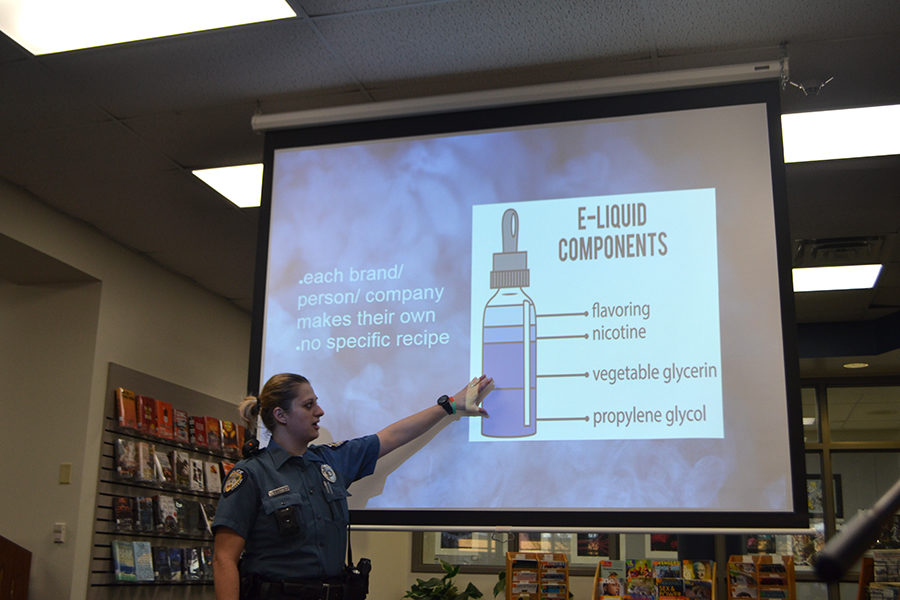Administrators work to end the vaping epidemic
April 5, 2018
Rockwood Elementary SRO Sanda Smajlovic presents information on vaping to faculty on March 21, 2018 during the faculty meeting at a school late start.
With an increase in on-campus vaping and a growth in awareness of the issue, students and parents alike demand answers as to what the administration is doing to solve the problem.
With on-campus vaping amping up its appearance around the building, National Education Association Representatives requested principal Jeremy Mitchell train the staff.
“Students have tricks for how to vape in class, so we want to educate teachers on what the mechanisms look like,” Mitchell said. “Department chairmen have sent out visuals to teachers, but a more hands-on discussion is necessary to educate people.”
In response to the previous article regarding on-campus vaping, parents criticized the disciplinary system and the administration for its response.
“I think there should be the same firm consequence for all students, regardless of their previous disciplinary background,” parent Robin Vierling said. “I do not like that not all students have the same consequences when caught vaping, because this opens the opportunity for favoritism. Every student should face the same consequence, regardless of being an athlete, non-athlete, ‘A plus’ student, failing student or delinquent.”
The current disciplinary system is dependent on the history of the student.
“Anybody that is in possession of a vaping device or using a vaping device gets a first offense, which is a long detention,” sophomore assistant principal Mario Pupillo said. “The second offense can be a day long out-of-school suspension. Long detentions are my responsibility, but any time that a student is suspended from school, doctor Mitchell is the one that suspends the students, being the head principal. There’s a letter that goes home from both him and the assistant principal.”
The administrators believe that they are doing what they can to inform the teachers, parents and the student body about vaping and how to prevent it.
“We sent an email to all parents and kids containing general information, because the issue is that there is so much unknown about it,” Mitchell said. “During our late start, officer Scoggins had a conversation with the teachers about the basics and the 101 of vaping so they can know what to look for. Unlike cigarettes where it’s so obvious if a student has been smoking, vaping has all different types of flavors and smells, so it’s a little bit more difficult. We’re just trying to provide everyone with information and to raise an awareness for it.”
Despite the efforts to educate teachers and students, administrators are finding this difficult because of the lack of information about vaping in general.
“We are interested in having further discussion on vaping,” Pupillo said. “I think there are some questions out there still such as ‘Does it get worked into the health curriculum?’ and, as we learn more about the effects of Juuls and vaping, ‘Where does that fit into educating kids?’ and ‘How can we be more proactive on the subject?’”
While many believe that it is the school’s job to keep students informed on the issue, parents think that information is not enough, and to have proper awareness, a strict disciplinary system must be in place.
“I think education starts at home,” Vierling said. “We, as parents, should be having these conversations at home and they should continue at school. Students need to be fully aware of the effects of vaping, but it is not solely the school’s responsibility to teach our kids about it. We should be partnered in the effort. This is why we need the school to have clear consistent consequences for students who choose to vape.”
Along with educating students on the issue, the question that remains is how to stop the students from participating in vaping.
“It’s the administrators’ job to keep the school a safe environment,” Mitchell said. “Obviously, the teachers will help us, but it is primarily the role of the administrators. We want our teachers to focus on helping our students be critical thinkers and lovers of learning rather than focusing on being the vape police.”
While administrators are responsible for controlling the issue on-campus, this system is not sufficient to parents who believe there should be stronger control. “It does appear as if their hands are tied on how to discipline students caught in possession or caught vaping,” Vierling said. “We need a zero tolerance policy with firm consistent consequences.”

